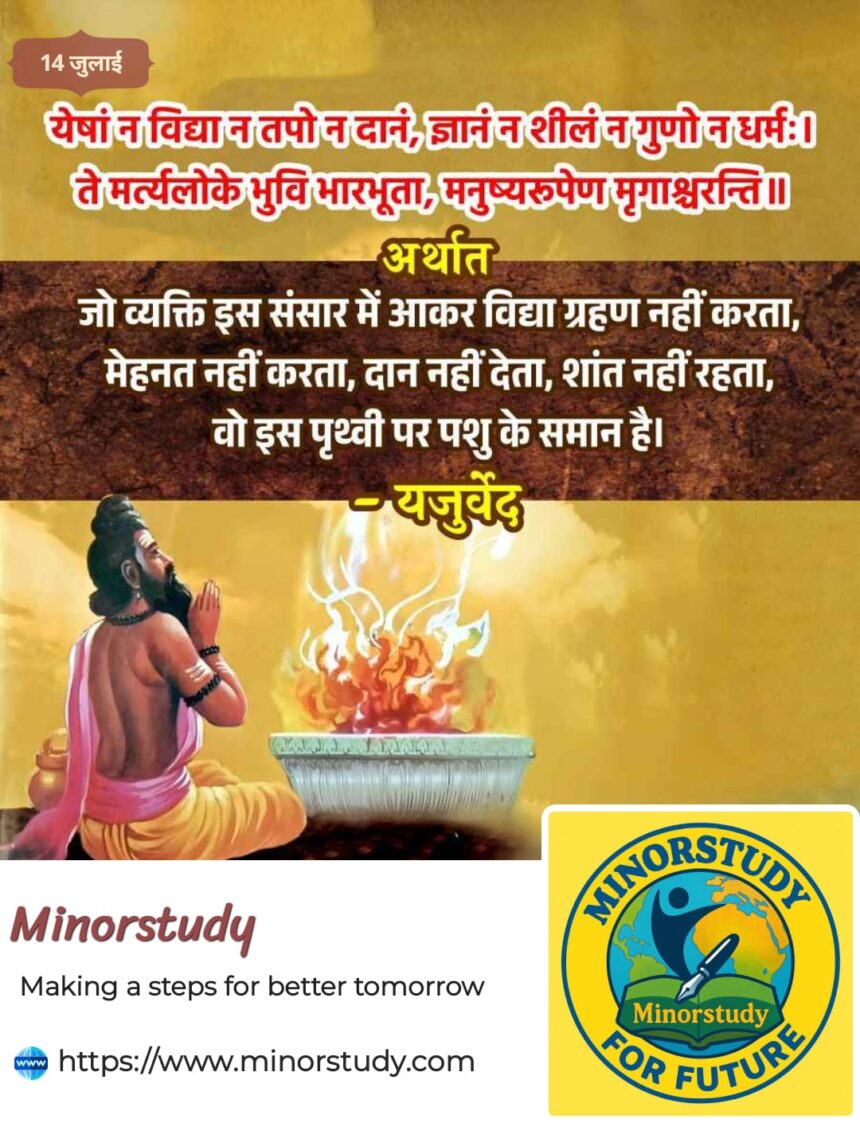🌟 7 Unshakable Lessons from the Yajurveda That Expose the Danger of a Wasted Life
“Yes, there is no knowledge, no penance, no charity, no modesty, no qualities, no religion — such a man is a burden to Earth, wandering as a human in form.”
— Yajurveda
The Yajurveda, one of the four Vedas of Sanatan Dharma, is not just a sacred scripture; it is a practical life guide that remains incredibly relevant even thousands of years later. This verse, powerful in tone and uncompromising in message, urges us to rise above mediocrity and animalistic living to embrace human potential in its fullest form — through knowledge, discipline, charity, humility, and virtue.
- 🌟 7 Unshakable Lessons from the Yajurveda That Expose the Danger of a Wasted Life
- 📚 History of the Yajurveda: Foundation of Ritual and Dharma
- ✨ Deep Meaning of the Verse: The Human Responsibility
- 📅 Timeline and Context of the Yajurveda
- 🧭 The 7 Essential Lessons from This Vedic Teaching
- 1. Knowledge is Your True Weapon
- 2. Discipline Builds Inner Power
- 3. Charity Purifies the Soul
- 4. Humility Is the Mark of Real Greatness
- 5. Cultivate Virtues Over Achievements
- 6. Live According to Dharma
- 7. A Human Form Without Human Values Is Dangerous
- 🙏 Daily Life Impact: How to Apply This in Today’s World
- 💬 Inspiring Vedic Quotes That Reflect This Message
- 🕉️ Significance in Society and Humanity
- 🤝 Wishing in Vedic Style
- ❓ FAQs About Yajurveda and Its Teachings
- Q1. What does the Yajurveda focus on?
- Q2. Is the Yajurveda still relevant?
- Q3. What is the biggest takeaway from this verse?
- Q4. Is Yajurveda meant only for ritualistic people?
- Q5. How can I start applying its lessons?
- 🏁 Final Thoughts: Be a Blessing, Not a Burden
Let’s explore the rich layers of wisdom hidden in this one shloka and understand how it applies to our daily lives, personal growth, and societal impact.
📚 History of the Yajurveda: Foundation of Ritual and Dharma
Veda Name: Yajurveda (from “Yajus” = sacrifice, “Veda” = knowledge)
Purpose: Manual for rituals, yajnas (sacrifices), and disciplined action
Divisions:
Krishna (Black) Yajurveda – Mixed prose and verse
Shukla (White) Yajurveda – Organized, clearer, systematic
Timeframe: Believed to be composed between 1200 BCE to 800 BCE
The Yajurveda is the spiritual framework behind the performance of karma (action) and dharma (righteous duties), making it a key driver of human discipline and evolution.
✨ Deep Meaning of the Verse: The Human Responsibility
This particular verse from the Yajurveda is harsh but awakening. It lists qualities that define a human and without which one is no better than an animal:
ज्ञान (Knowledge) – Ignorance is darkness; knowledge is light
तप (Penance/Discipline) – Without self-control, there is no growth
दान (Charity) – Sharing is what separates us from animals
शील (Modesty) – Humility is the highest virtue
गुण (Virtue) – One must live with purpose and value
धर्म (Righteousness) – Living for truth and responsibility
It concludes that if one doesn’t cultivate these, they are merely burdening the earth, born as a human but lacking humanity.
📅 Timeline and Context of the Yajurveda
| Period | Key Event |
|---|---|
| 1500 BCE – 1200 BCE | Vedas composed and orally transmitted |
| 1200 BCE – 800 BCE | Yajurveda formation, rituals evolve in structure |
| 800 BCE – 500 BCE | Transition to Upanishadic era—deeper philosophical inquiry |
| Post 500 BCE | Rise of interpretations by sages like Yaska, Panini |
| Modern Day | Teachings of the Yajurveda translated, practiced in yajnas, spiritual learning, yoga philosophy |
🧭 The 7 Essential Lessons from This Vedic Teaching
1. Knowledge is Your True Weapon
Without learning, a person remains stagnant—unable to distinguish between right and wrong.
2. Discipline Builds Inner Power
Penance (Tapas) doesn’t mean just suffering; it means endurance, restraint, and purposeful living.
3. Charity Purifies the Soul
Giving selflessly aligns you with divine nature. Hoarding makes us disconnected.
4. Humility Is the Mark of Real Greatness
A tree full of fruits bows down. So does a wise human. Pride destroys; humility builds.
5. Cultivate Virtues Over Achievements
One’s moral character is more important than outer success. Kindness, truth, forgiveness are eternal values.
6. Live According to Dharma
Dharma isn’t religion; it’s your duty to self, society, nature, and God. Without dharma, a person lives in illusion.
7. A Human Form Without Human Values Is Dangerous
The Vedas declare it clearly—such a being is not only worthless but a burden to society and Earth.
🙏 Daily Life Impact: How to Apply This in Today’s World
Start the day with self-reflection – Are your actions knowledge-driven or habit-driven?
Engage in charity – Even small acts of giving (a smile, food, knowledge) uplift the soul.
Be disciplined in eating, speaking, and spending time – That’s real penance.
Live with gratitude and humility – Recognize everyone’s role in your life
Study something every day – Keep learning to remain alive spiritually.
Stand for justice, truth, and compassion – That is dharma.
Check yourself: Are you truly human in conduct, or just biologically?
💬 Inspiring Vedic Quotes That Reflect This Message
🔹 “Na vidya, na tapas, na daanam — yatha pashuhu.”
(Without knowledge, discipline, charity — a man is just like an animal.)
🔹 “Satyam vada, dharmam chara.”
(Speak the truth, live righteously.)
🔹 “Aham Brahmasmi.”
(I am divine – and so are my actions and responsibilities.)
🕉️ Significance in Society and Humanity
This Vedic view urges us to create a responsible, ethical, and compassionate society. It discourages idleness, selfishness, and ignorance, which are major threats to modern civilization.
Encourages education and values-based learning
Inspires service, self-improvement, and empathy
Prevents moral decay by making each person accountable to society and nature
🤝 Wishing in Vedic Style
🌞 May your life be rich with knowledge and purpose.
🌸 May your actions reflect compassion, humility, and wisdom.
🕊️ May you be a blessing to the Earth, not a burden.
🕉️ Let your human birth not go in vain. Strive, give, rise.
❓ FAQs About Yajurveda and Its Teachings
Q1. What does the Yajurveda focus on?
A: It focuses on sacrificial rituals, karma (action), and how to live righteously and responsibly.
Q2. Is the Yajurveda still relevant?
A: Absolutely. Its ethical and spiritual principles are universal and timeless.
Q3. What is the biggest takeaway from this verse?
A: Without spiritual and moral growth, a human is only human in form, not in essence.
Q4. Is Yajurveda meant only for ritualistic people?
A: No. Though it guides rituals, its inner meanings are for everyone—householders, students, monks, leaders.
Q5. How can I start applying its lessons?
A: Start by practicing truthfulness, humility, learning daily, giving selflessly, and living with conscious intention.
🏁 Final Thoughts: Be a Blessing, Not a Burden
This stirring verse from the Yajurveda isn’t meant to shame, but to awaken. It’s a powerful reminder that being born human is not enough — we must live like one.
A person without knowledge, penance, compassion, or values might walk upright, speak eloquently, or wear fine clothes — but inwardly, they are lost. The Yajurveda boldly challenges us: Don’t just survive — thrive with virtue.
Be the tree that bends with fruit, not the empty one that stands tall in pride.








